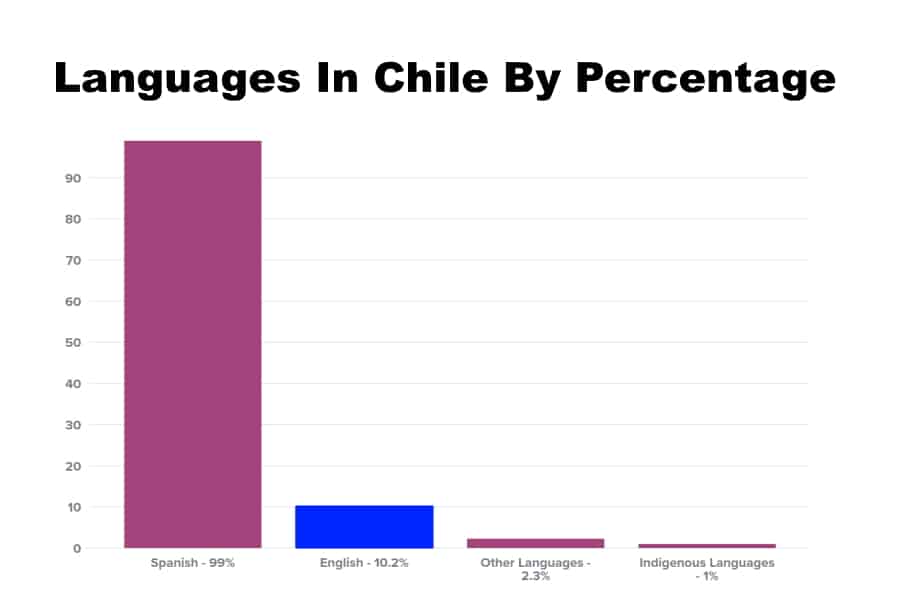English is the most widely spoken second language in the world in education, business, travel, and media. Yet, this is not something that is evenly spread around the world. Countries in South America especially tend to have much smaller portions of their populations able to use English. So, how common is English in Chile?
English is not commonly spoken in Chile either in the tourist areas or larger cities. 10.2% of the population speak it, which amounts to 1,867,408 Chileans having some level of English language skill. This means that only 1 in 10 speak English and these are usually in more affluent areas.
In this article we will dive into how prevalent English actually is in Chile and where it can be found. There are some interesting reasons behind their levels of English and it contrasts with the other countries around them. To find out more, read on.

Contents
- 1 How Many People Speak English In Chile?
- 2 What Percentage Of Chile Speaks English?
- 3 What Are The Top Languages Spoken In Chile?
- 4 Where Is English Spoken In Chile?
- 5 Can You Get By With Just English In Chile?
- 6 Is English Taught In Chilean Schools?
- 7 Is There English On Chilean Movie And Television Screens?
- 8 Do Chileans Use English In The Workplace?
- 9 Can English Be Found On Street Signs In Chile?
- 10 The Final Word On How Common English Is In Chile…
How Many People Speak English In Chile?
With Chile being in the top 100 most populated countries in the world, it stands to reason that there will be some English speaking presence in the country. This is added to the large influence that American culture has around the world. So, how many people actually speak English in Chile?
There are 18,307,925 people in Chile according to 2021 estimates, making it the 66th most populous country in the world. With 10.2% of them having some sort of English language proficiency, 1,867,408 of Chileans can speak English. These numbers mostly appear in educated and wealthy areas.
With 1.348 billion people speaking English in the world, Chile’s nearly 2 million may seem small, but in a country where 99.5% of the population speaks one official language, it is not that bad. There are also efforts in public schools to increase the number of English speakers, though the progress is admittedly slow.
What Percentage Of Chile Speaks English?
In terms of percentage of the population that speaks English, this is where you can understand what it might ‘feel like’ to try to speak English in Chile. There are two ways to look at this: percentage and proportion. So what does it ‘feel like’ in Chile to speak English?
Of the more than 10 languages that make up communication in Chile, English is spoken by 10.2% of the population. This constitutes language learners and small groups of expats from English speaking countries. This means that 1 in 10 people you meet will have some level of English in Chile.
As you can see, it would not be very comfortable to try to communicate on a daily basis with English as your only language. 90% of the time you would be speaking to someone that doesn’t understand a word you are saying. In terms of percentages, this is very significant.
In larger cities or near universities this could be a bit better than other places, but in reality even a rudimentary knowledge of Spanish would take you much farther than English.
What Are The Top Languages Spoken In Chile?

There are are four main categories of languages spoken in Chile with English holding its own group sizable enough to be measured. There is a multilingual element to the Chilean culture, but it is noticeably smaller than in some other countries in the world. According to the CIA Word Factbook, here are the top languages (or language groups) in Chile.
The top languages spoken in Chile are as follows:
- Spanish – 99.5% of the population (18,216,385)
- English – 10.2% of Chileans (1,867,408)
- Other Languages – 2.3% (421,082)
- Indigenous Languages – 1% (183,079)
Some of these languages are chosen because of heritage links of certain groups in the country and others are chosen due to immigration or political relations. Business and tourism also have a part to play in the language makeup in this country and the region. English has the largest influence of all non-official languages.
What is The Official Language Of Chile?
Most all countries have an official language, the one used in the government and primarily taught in schools. Some countries even have multiple official languages. What is the official language (or languages) in Chile?
The sole official language of Chile is Chilean Spanish, with 99.5% of the population speaking it. Though English is taught in some school systems in Chile, it only influences the society enough to have a relatively low 10.2% of the people speaking it. Spanish is by far the dominate language.
With a relatively low bilingual tendency in the country, it is actually quite remarkable that English has the presence that it does. Spanish is entirely dominate in the country with usually only educated and affluent populations speaking English as a second language.
What Other Languages Are Spoken In Chile?
Along with the official Spanish spoken by most households, what other languages can someone expect in Chile? This come in two forms. There are indigenous languages and other languages (mostly European). So, what are the languages that can be found in Chile?
Other languages in Chile include English, German, and indigenous languages spoken in specific regions. German speaking has declined in recent years to around 20,000. The popular indigenous languages include: Likan Antai, Rapa Nui, Diaguita, Quechua, Kawesqar, Colla, and Yagan.
English is found in mostly affluent or educated populations, whereas German can be found in a dwindling past immigrant population. Among the 20,000 German speakers, with 8,000 estimated to be German immigrants and their children, there are German language schools and even periodicals.
Indigenous languages are usually geographically centered and ethnically perpetuated. The number of speakers is relatively small, but the knowledge of the languages are passed down through family lines that ensure their survival.
If you like this article, you may also like…
- How Common Is Spoken Spanish In Brazil?
- Will Spanish Replace English In The USA?
- How Common Is Spoken German In The Netherlands?
Where Is English Spoken In Chile?

English in most of the world can regularly be found in larger cities, around tourist destinations, and near university campuses. This is only true in countries friendly toward the language, but pretty consistent within them. So, with Chile sporting over ten percent of its population that speak English, where in the country can it be found the easiest?
Santiago
Population 4,837,295 – Being the national capitol and having ties to international trade and diplomacy, Santiago naturally has some of the higher levels of the English language in the country. That being said, it is unlikely that these speakers will be working at hotels, restaurants, or in the public transportation system.
Tourism is also a noticeable part of cities of this size, even if other destinations are included in the trip. Hotels and restaurants as well as museums and other Santiago attractions are a better bet when looking to talk with other English speakers.
With two large universities in the city, Universidad de Chile and Universidad de Santiago de Chile there are places that English speakers can find others. These campuses boast a combined enrollment of 61,416 students. Younger and educated populations in Chile have levels of English that are above the norm in most any city.
Antofagasta
Population 309,832 – Whether you are going to see the picturesque archway of La Portada or Mano de Desierto outside the city, tourism does have its place here. You may find a tour guide or a shop keeper or two along your way that understands or speaks a bit of English, but it is best to ‘stay with the group’.
There is a university campus in the city that has 8,172 students that can help offer a better chance to find English conversational skills, but even there with a population that small it could be a challenge. The Universidad Pedro de Valdivia still will offer one of the better opportunities to find English in the city.
Viña del Mar
Population 294,551 – Whether it is for the festivals, museums, or beaches, visiting Viña del Mar is a destination for tourists from within and outside of the country. English will only be easy to find in usable forms by specific tourist centers like hotels, restaurants, and attractions. Even then it can be hit and miss.
The Universidad Andrés Bello with its 48,255 students offer a better chance to find English speakers both from students studying the language and from international students. This campus can be a help to those needing assistance or direction when other places come up short.
Valparaíso
Population 282,448 – Known for its population of bohemian and hipster cultures, Valparaíso is a haven for the more liberal minded. The nightlife and younger population areas offer some English where older more established communities may not.
On the other side of the spectrum is the Pontificia Universidad Católica de Valparaíso belonging to the Catholic Church and having 14,573 students enrolled. This campus can be a haven for other languages including Italian, German, and English.
Easter Island

Though Chile in total may not be known as a world renowned tourist destination, Easter Island is most definitely a contrast. Known the world over for the giant statues made centuries ago, the English levels may be higher in tourist hotspots in the area.
Believe it or not, on this small island in the South Pacific, there are several hotels and restaurants. With languages from all over the world coming to the island, it is likely that several employees will be multilingual. English will probably be part of the mix.
Can You Get By With Just English In Chile?
Travelers, business professionals, and foreign exchange students heading to many countries from the United States, Canada, Australia, and Great Britain at one time or another wonder about this question. Let’s look at it in relation to Chile. Can someone get by only using English in Chile?
It would be difficult to get by with only English living, working, or even visiting Chile. The tourism industry is not as prevalent as in many other countries and won’t have as many English proficient employees. Only about 1 in 10 people you randomly meet will speak some level of English.
This goes for schools and businesses not tourist related as well. The place you will find the most English is usually as an educational benefit given to children and university students in upper socioeconomic levels of society.
This is partly due to the inadequate teaching methods and motivation in public schools. Yet, it also speaks to the importance placed on English in some countries for higher education. Families wanting their kids to get a college education usually spend extra money in order for them to gain usable or at least testable levels of English.
Is English Taught In Chilean Schools?
The vast majority of these nearly 2 million English speakers are centered around larger cities, universities, tourist destinations, and more affluent segments of society. English is not a natively spoken language and is learned by those with the means to spend the money and time.
English is taught in schools in Chile with affluent segments of society spending money and time to reach high proficiency levels. According to the English Proficiency Index (EPI), Chile is ranked number 37 in the world, with English taught in schools a primary reason.
Though some schools in the country in less advantaged areas have had increased government funds and programs to promote English language proficiency among children, they still rank number 37 in the top 100 countries on the EPI scale.
Progress has been made, but there is a long way to go if Chile’s government wishes to improve its population’s competitiveness in a world that is increasingly an English speaking one.
There is no replacing diverse languages in nations and societies with their links to culture. Yet, there is also no denying the place of English in the global marketplace.
Is There English On Chilean Movie And Television Screens?
English speaking media around the world is relatively dominate. This goes for educational, entertainment, and eve the ‘info-tainment’ varieties (the mainstream news media). With this being the case, is there a noticeable level of English on Chilean screens, both big and small?
Other than in larger cities like Santiago, much of what is on public and paid programing as well as movie screens is dubbed into Spanish. In a few larger cities you can find films in English with Spanish subtitles. Much of the dubbed programming is imported from Mexico, with some done in Chile.
There are normally three avenues that a country will go down in this regard.
- Dubbing everything into the official language.
- Dubbing only children’s programing into the dominate language.
- A combination approach using some dubbing and some subtitling of foreign media.
For Chile, it is usually the first in this list. Though there are some exceptions in larger cities, usually all media is dubbed into Spanish. It is interesting to note that many Chileans complaign about other Spanish accents in their media, but this same thing applies when dubbed films or shows are exported to other Central or South American countries.
Though English speakers predominately see Spanish as a monolithic language, in actuality it has many dialects.
Do Chileans Use English In The Workplace?
With a country like Chile having such a large coastline, it is important that some industries like tourism and shipping have are representation of the languages from the countries they do business with. This would make sense, but in Chile only English has any measurable presence in the workplace. But is that level very high or significant?
English is not widely used in the Chilean workplace. In tourist and other industries with ties to international trade, business conducted with English speakers could have decent levels spoken. Yet, for the vast majority of business in Chile, Spanish will be the language most heard and used.
This is understandable with the English levels in the country as a whole, though in certain industries there may be a higher concentration of bilingual employees and management, which would include English.
Tourism is not as developed in Chile as some other countries in the top 100 English speaking countries in the world. Though there are places like Easter Island and miles of coastline, it has not been a major focus of Chilean development. This lowers much of the reason for locals to speak English.
Can English Be Found On Street Signs In Chile?
If you plan on driving in Chile or simply using signs to help you get around, you will find very little English if at all on street and directional signs. To be honest, this is the case even in the countries with the most English proficiency. Signs in the modern times have been designed for those who can and cannot read.
English is not common on Chilean street signs. As with most industrialized countries around the world, street signs in Chile are of the pictograph type. But unlike some countries, even the ‘STOP’ signs with their one word commands are written in Chilean Spanish: ‘PARE‘.
There may be exceptions at airports or even at border crossings, but for the most part English is used as an academic second language in Chile and not commonly spoken for regular communication. This also applies to signs and public communications.
The Final Word On How Common English Is In Chile…
Though English is not widely spoken in Chile, it does have more of a presence there than in many countries in the world. With one in ten speaking English it may be a struggle to find it there, but compared to one in twenty like many countries, it is quite a bit easier.
English is taught in schools and the government is actively promoting children to learn it, but Spanish has long been the dominant choice for the vast majority of the populace. With affluent parents wanting higher education for their children, English holds a high priority for them and their families.
Whether you are planning a vacation, business trip, or student exchange, learning Spanish to a basic level would greatly help your travel and communication. If you just rely on English, you are handicapping yourself from the start.
To read more like this, I recommend my other articles…
- How Common Is Spoken Spanish In Brazil?
- Will Spanish Replace English In The USA?
- How Common Is Spoken German In The Netherlands?
References
